An inpatient at Mediclinic Legae’s mental healthcare centre describes how treatment gave her the insight and tools to thrive after a mental health breakdown.
Health emergency
When Ms M went to Mediclinic Legae Emergency Centre in September 2023, she was in crisis. “I wasn’t feeling well, and my blood pressure was very high,” she says. “I was panicky, overwhelmed and extremely emotional.”
Although she’d been feeling anxious and unable to cope leading up to this event, she had no idea she was having a mental breakdown. “At the time, I didn’t even know I was depressed. I thought I was just tired and burnt out and maybe needed some vitamins to keep me going.”
After being given a tranquiliser at the Emergency Centre, Ms M, a mother of two, agreed to be admitted to the hospital’s specialist mental healthcare centre for psychiatric evaluation. She was prescribed medication to help her sleep on the first night and the next morning received an orientation to the unit.
Mental health treatment plan
Ms M, who says she felt comfortable at the centre, completed 21 days of mental health treatment before returning to work.
“Most members of medical aid or hospital plans are entitled to 21 days of in-hospital treatment,” says Dr Thabo Mogotlane, a specialist psychiatrist and head of the Mediclinic Legae mental health unit. "This allows the psychiatrists and psychologists enough time to evaluate patients through individual and group therapy sessions, and prescribe the correct medication, if necessary.
“It also gives patients time to identify maladaptive behaviour and develop new skills to cope with challenges and promote positive mental health.”
Besides medication, Ms M’s treatment plan included a daily programme of individual and group therapy sessions, therapeutic arts and crafts, and individual sessions with her psychiatrist and psychologist. She says she found both the group therapy sessions and the individual consultations very helpful.
“The consultations weren’t rushed, and I had enough time to tell them how I was feeling, mentally and physically. This helped me think more calmly and get better. It was also good to keep my mind busy by learning to focus on one thing and complete tasks. That did a lot for me.”
How mental health treatment helps you cope
Ms M adds that the programme led to many self-realisations and an opportunity to set new boundaries for her own wellbeing.
“I came to see how I overthink and over-internalise things,” she explains. “I take other people’s problems home with me, and I end up suffering. I had sessions about being assertive and learnt to fill my cup first before giving to others.”
Ms M has adopted many of the self-help approaches she was introduced to at the centre. “Now, before I act, I take a moment to breathe and think before I assist the next person. I have been saying ‘no’ a lot, and it feels good. I have my own obligations and bills to pay.”
For a few months Ms M was prescribed anti-anxiety medication, which she has weaned herself off under medical supervision. “I’m learning to cope without medication using skills we learnt in the unit. I know some of my primary triggers and am alert to certain behaviours. I can then stop, reflect, and take better action.”
Overcoming the mental health stigma
On her return to work, Ms M says she was able to be more assertive. “If I’m given an overwhelming amount of work, I speak out and set my limits instead of working until I burn out. I’ve also learnt to prioritise tasks and plan my day. As I’m a perfectionist, I need to give myself more time. Since I began making my children’s lunches the night before, for example, my mornings have become calmer.
“I’m taking care of myself now and making sure I get enough sleep. I’m better able to attend to my children without being worn out, grumpy, and irritated. I’m much more relaxed than before because I now know how to plan.”
If you’re mentally unwell you can’t be a good employee, parent, or partner, Ms M points out. “However, there’s still a stigma in South Africa about mental health, especially among black people. Some think that if you go to a facility, you’re ‘crazy’. We need to break away from this stigma.
“Sometimes, you just need time out to take care of yourself. Once you’ve done that, you can take care of other people again.”
To find a mental health professional near you, go to www.mediclinic.co.za.
Further publications on the topic
Doctors 1


